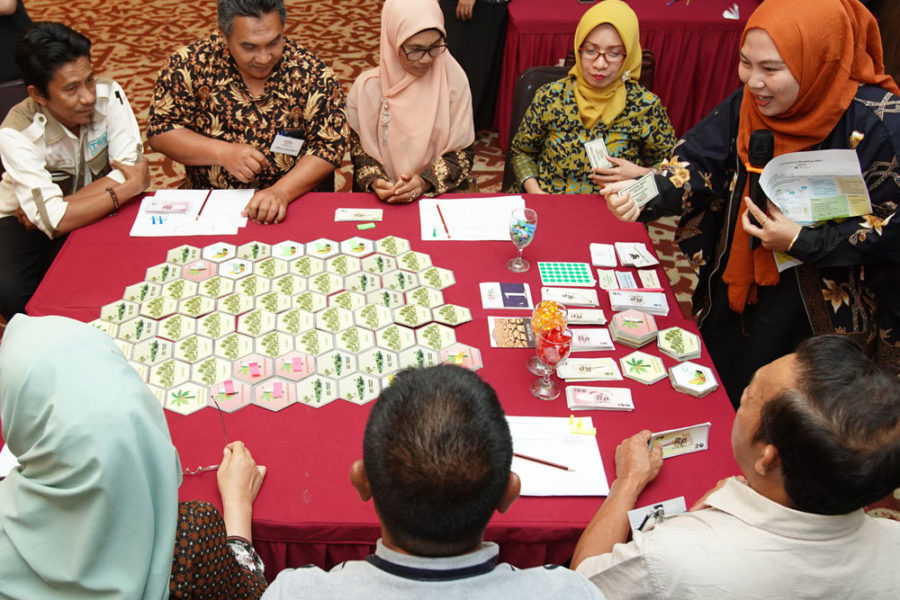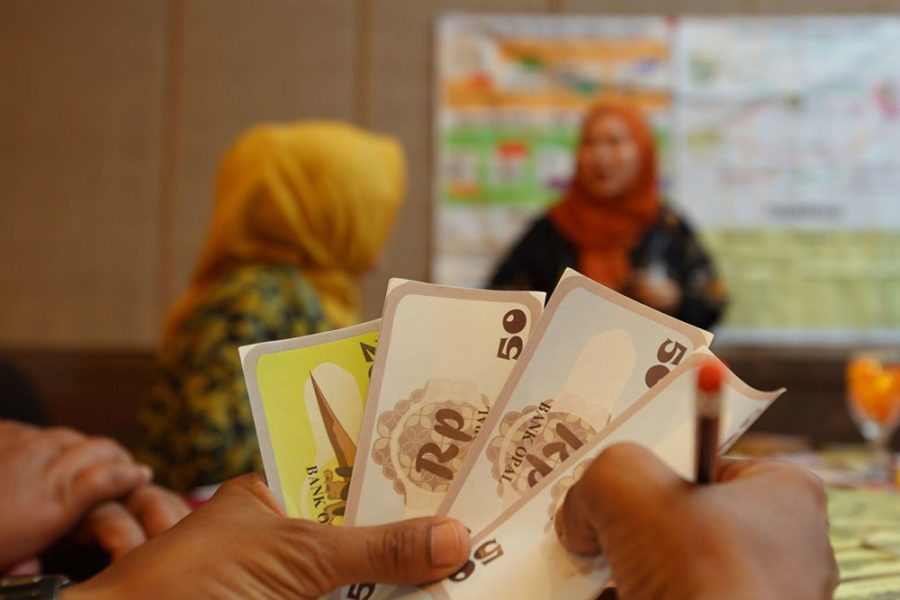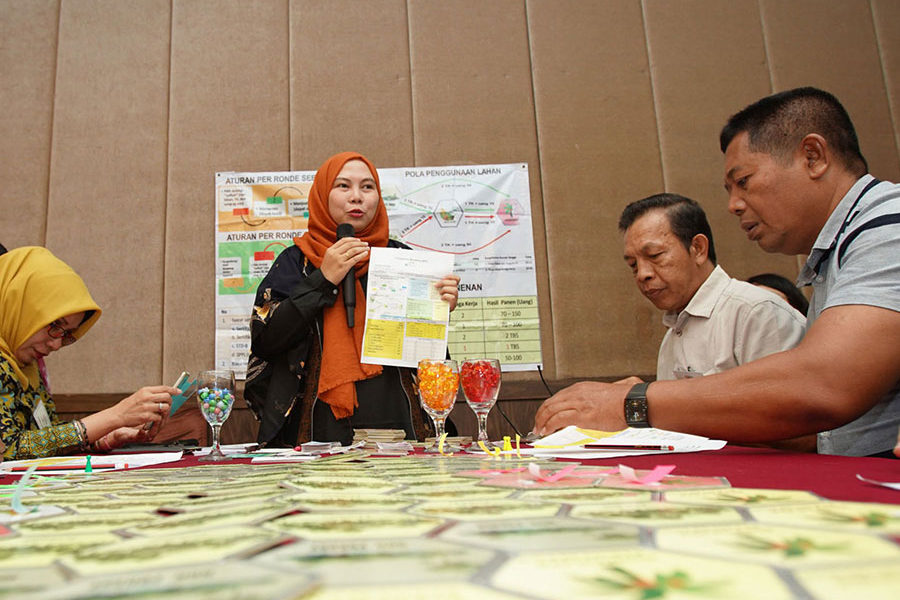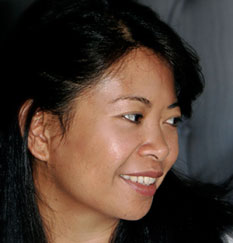We want you to share Forests News content, which is licensed under Creative Commons Attribution-NonCommercial-ShareAlike 4.0 International (CC BY-NC-SA 4.0). This means you are free to redistribute our material for non-commercial purposes. All we ask is that you give Forests News appropriate credit and link to the original Forests News content, indicate if changes were made, and distribute your contributions under the same Creative Commons license. You must notify Forests News if you repost, reprint or reuse our materials by contacting forestsnews@cifor-icraf.org.
Indonesia’s old growth rainforests in Sumatra, Kalimantan and Papua are some of the most biologically diverse terrestrial ecosystems on the planet.
Over the past two decades, satellites have documented a different kind of tree encroaching on the borders of these old forests. Seen from space when the sky is clear, the characteristic deep emerald green color of natural forests is broken up at the edges by a lighter shade from which narrow, rectangular grids crisscross outward across the terrain.
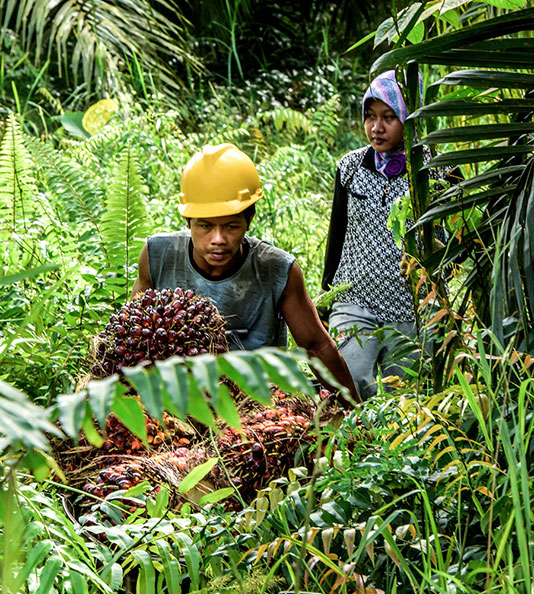
High stakes for all
On one side of this verdant border in one of the world’s largest carbon sinks, reside Indigenous communities, diverse animal and plant species.
On the other, the terrain is host to the oil palm — Elaeis guineensis — which yields the world’s most versatile vegetable oil, contained in food, toothpaste and soap. A complex web of big and small players produces, sells and buys palm oil worldwide, meeting demand that is projected to grow to more than 100 million tons per year by 2025 — 50 percent more than in 2016.
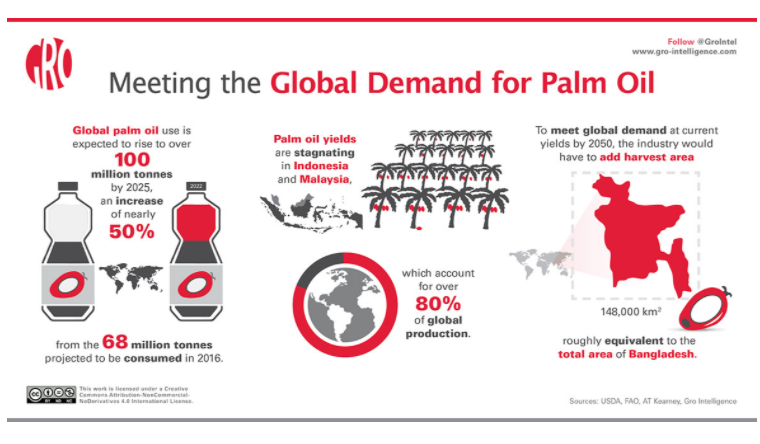 Source: https://www.gro-intelligence.com/insights/infographics/palm-oil-production
Source: https://www.gro-intelligence.com/insights/infographics/palm-oil-production
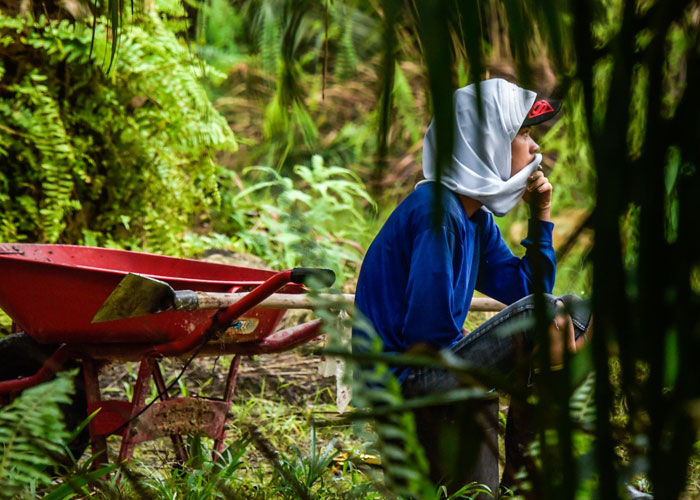
Oil palm plantations in Indonesia have expanded rapidly since 1968, when they occupied 120,000 hectares. Today, they occupy 16.4 million hectares, according to the country’s Ministry of Agriculture, putting the country’s biodiversity at risk, increasing its carbon emissions, igniting social justice and land-right disputes within and on the margins of plantations.
This expansion has led to a shift in the economies of rural communities. From primarily working in other types of agriculture, fisheries or trade, now people are more dependent on oil palm plantations.
For example, the expansion of plantations in the Muara Kaman subdistrict of Kutai Kartanegara District in the province of East Kalimantan dried up and polluted rivers in communities that have long depended on fishing, aquaculture and fish processing. As opportunities in the sector dwindled, households turned to available jobs in nearby oil palm plantations.
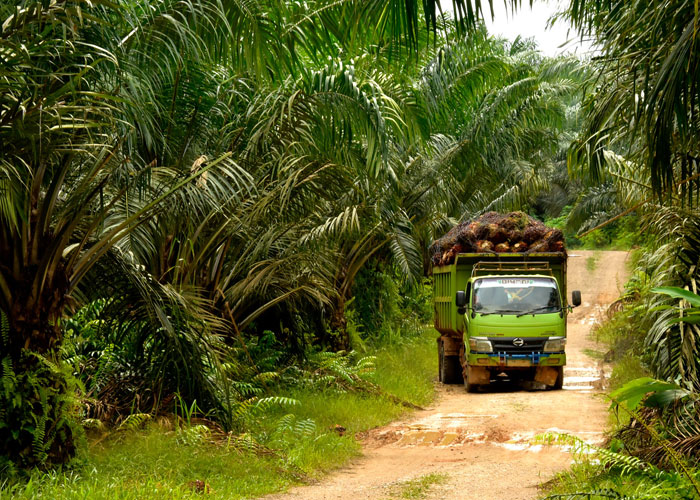
To address land disputes, labor-rights abuses, and deforestation related to oil palm expansion, the government introduced the Indonesian Sustainable Oil Palm (ISPO) scheme in 2011. Initially, it required major plantation companies to become certified under the scheme, but a recent update now also requires smallholder farms to be certified.
Yet challenges remain. In some plantations where management is poor and little oversight exists, stakeholders lack interest in becoming certified. Illegal palm oil plantation expansions, such as those in Kutai Kartanegara, also hinder the country from achieving its sustainability goals.
A tailor-made game
With Indonesia producing roughly half of the word’s palm oil, Oil Palm Adaptive Landscapes (OPAL) — a consortium of international institutions, led by Swiss university ETH Zurich — partnered with the Center for Agricultural and Rural Development Studies at Indonesia’s Bogor Agricultural University (IPB) and the Center for International Forestry Research (CIFOR) in 2015. Under a five-year project, the collaborators seek to improve the management of oil palm landscapes throughout the country and chart a path toward more sustainable production.
OPAL tasked four Ph.D. students in Indonesia to examine the socio-political, economic, and ecological drivers that transform forests and peatlands into palm oil plantations. Their findings underpin an innovative oil palm role-playing game developed in-house and tailored to Indonesia’s oil palm stakeholders. The game draws out challenges faced by smallholder producers in meeting targets and indicators required under ISPO certification rules.
The hope is that it will help develop a conversation between landscape stakeholders to ensure that sustainable objectives can be met amid rapid expansion.
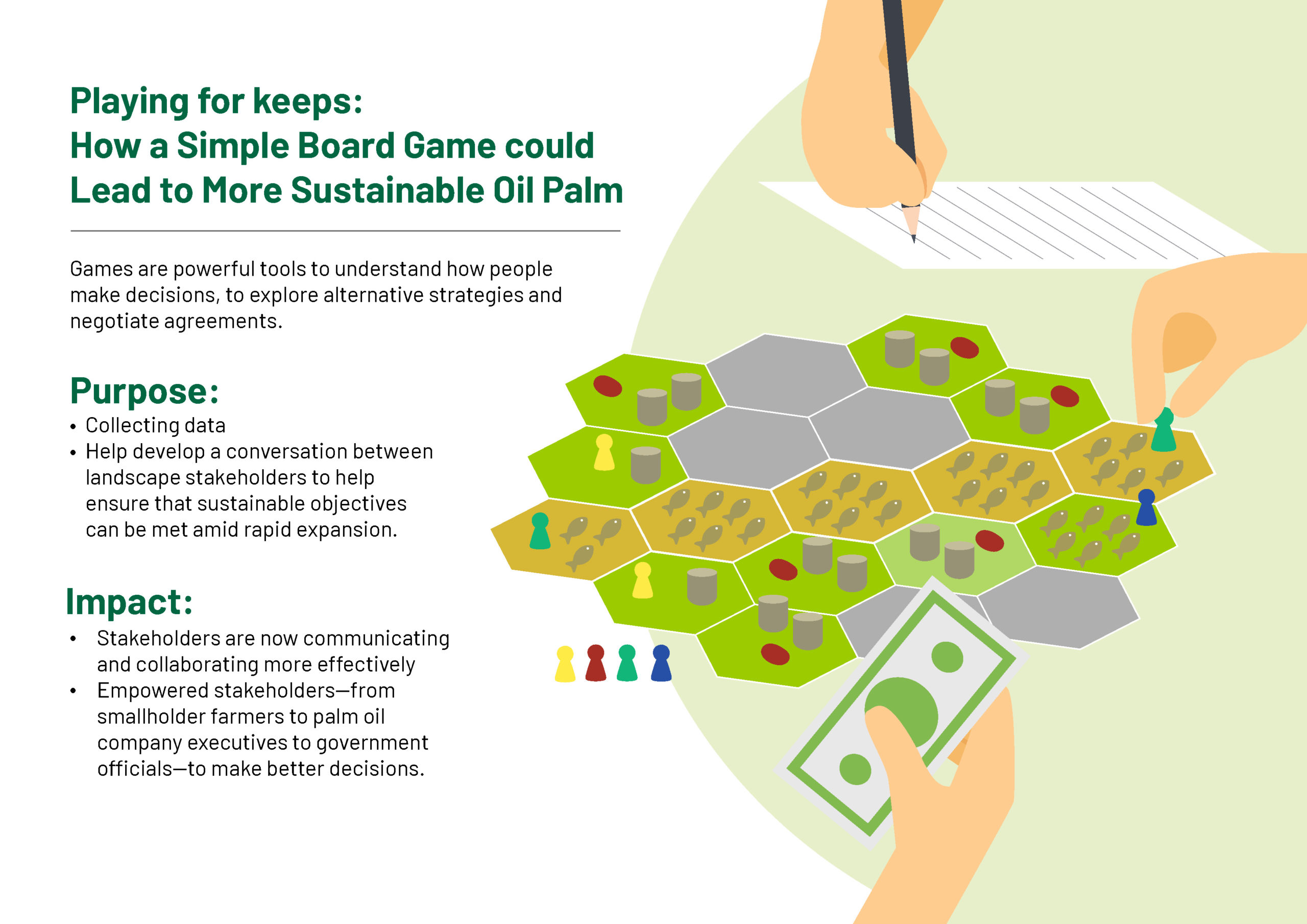
Role reversals
Small-scale oil palm growers in Kutai Kartanegara played the game with villagers, local government officials, staff from plantations, non-governmental organizations and private institutions — each person playing a role the polar opposite of their role in real life. The head of a plantation typically plays a smallholder farmer, who then plays a government official. Officials from the Indonesian Ministry of Agriculture also engaged in game sessions and in lively dialogues with officials from palm oil producing provinces.

“The players get a chance to reflect on the challenges of oil palm governance from a totally different perspective,” said OPAL researcher Bayu Eka Yulian, who developed the land-use change version of the game.
“The game also brought out issues that stakeholders were not previously aware of,” added Heru Komarudin, a CIFOR researcher and policy analyst whose portfolio includes OPAL. “Participants felt they were in a friendly environment and spoke freely even when discussing sensitive issues.”
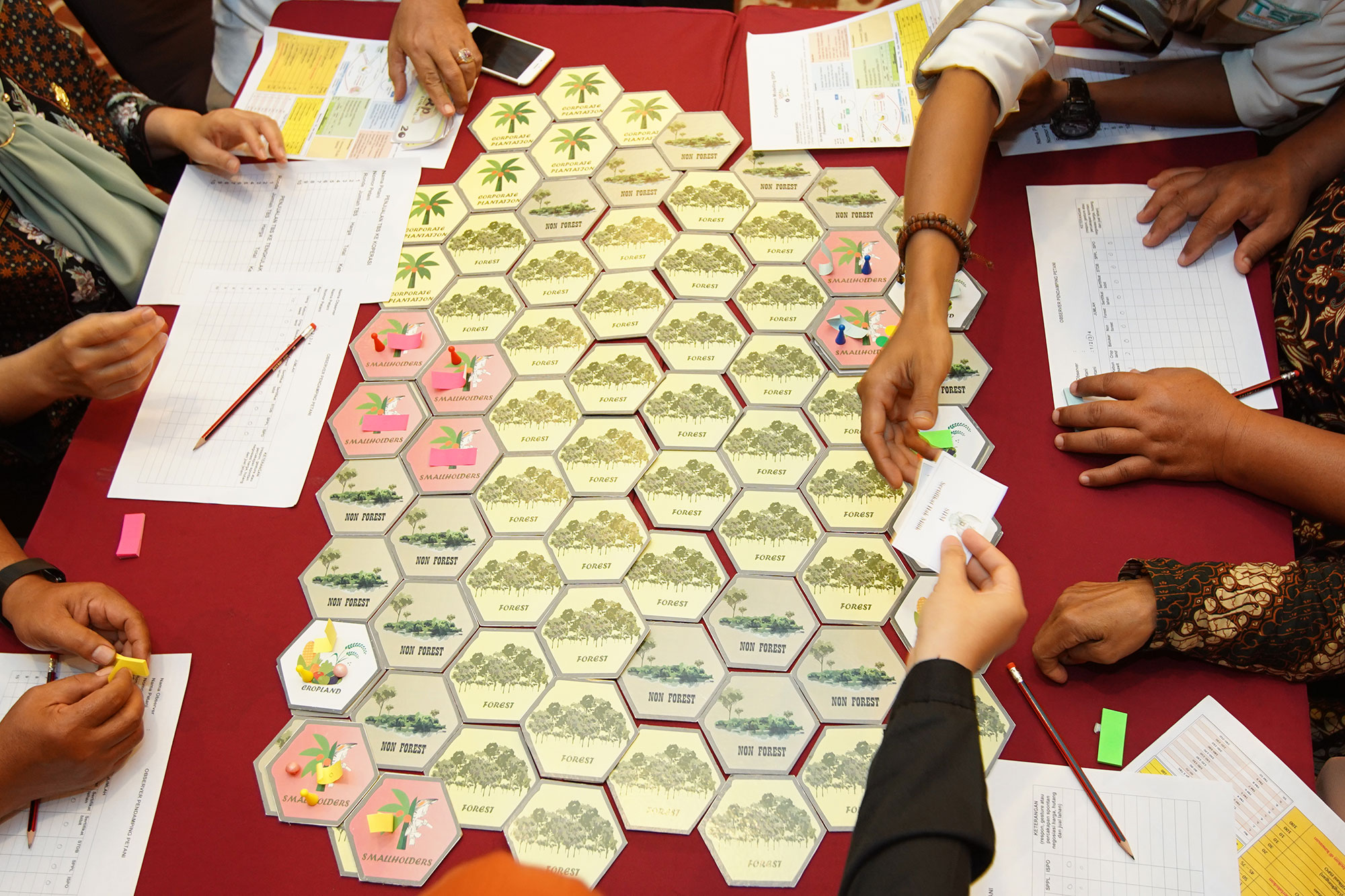
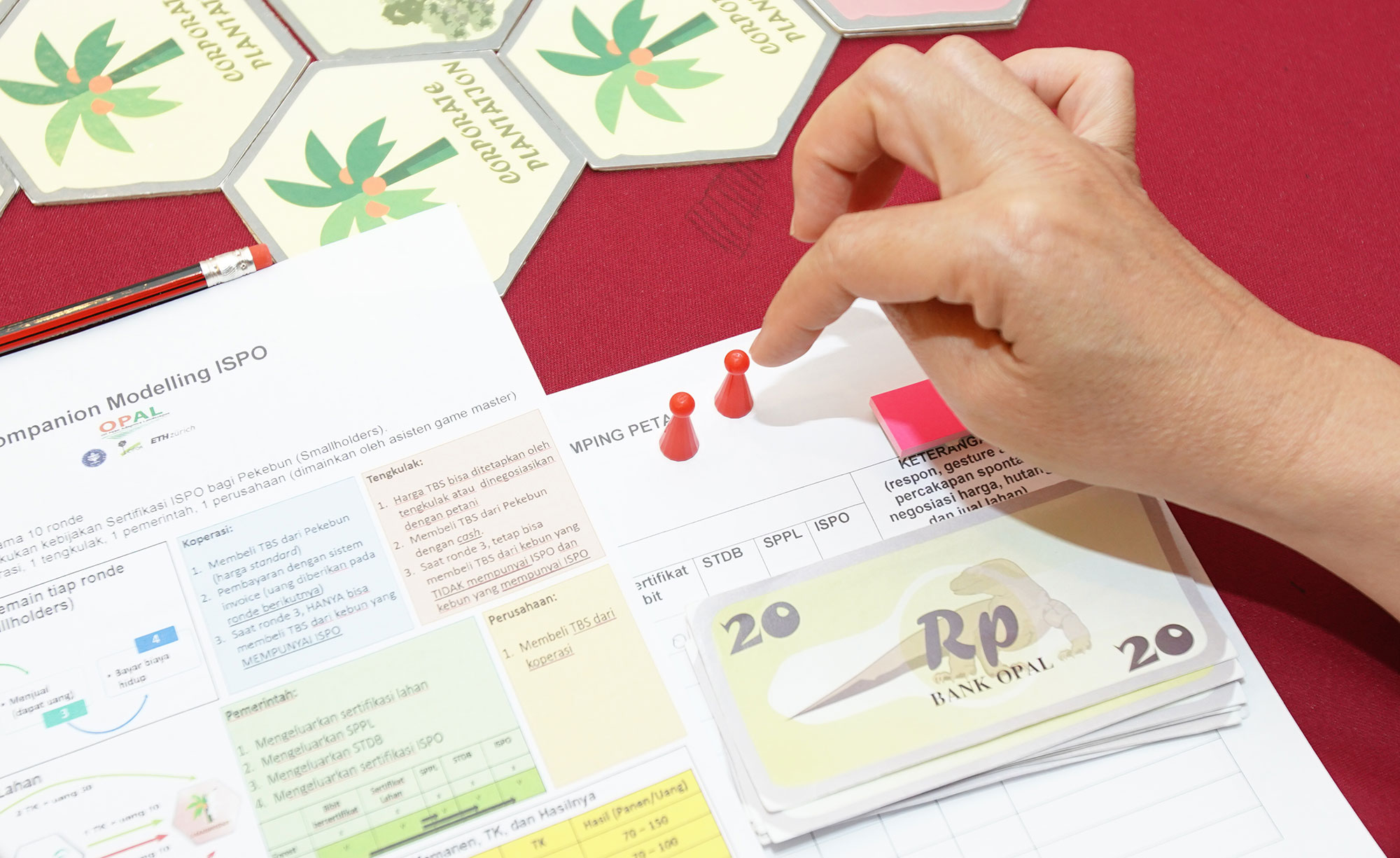
Linking science to policy
By 2018, OPAL researchers were providing expertise to policy and decision-making processes at community, regional and national levels.
Because of his research on the “silent expansion” of oil palm plantations — a strategy used by farmers to secretly and illegally expand their plantations through their relationships with middlemen — OPAL researcher Yulian now advises the Indonesian Ministry of Agriculture’s task force on revising nucleus-plasma policy as an expert in smallholder plantations. The Nucleus-Plasma Scheme mandates plantation companies to develop oil palm plots for smallholders, referred to as plasma, near their plantations, referred to as nucleus.
OPAL Indonesia IPB team coordinator Arya Hadi Dharmawan was involved, alongside other stakeholders, in advising the government on the revision of a decree that regulates standards of sustainable palm oil at the national level.
He also participated in inclusive policy processes to formulate what has since become known as “Presidential Decree Number 44.”
“The decree, which was enacted earlier this year, aims to promote an effective, efficient and just sustainable palm oil governance system through palm oil certification,” Komarudin said, referring to refined ISPO systems.
Knowledge gathered through OPAL activities, contributed significantly to these policymaking processes, he added.
Komarudin and Rizka Amalia, also an OPAL researcher, took part in a provincial forum for sustainable plantations in East Kalimantan, contributing to the development of local innovative regulations promoting the protection of High Conservation Value areas across fragmented oil palm plantations.



A way forward
Back in Kutai Kartanegara, stakeholders are now communicating and collaborating more effectively, Komarudin said. Facilitated by an OPAL project, local government officials and company personnel are working together with renewed focus to discuss scenarios for sustainable plantations, identify and validate high-conservation value locations across oil palm concessions, while contributing to a pledge made by the East Kalimantan provincial government to reduce carbon emissions.
While the future remains uncertain, it is clear that OPAL is helping to influence the conversation. In Kutai Kartanegara, the game has empowered stakeholders — from smallholder farmers to palm oil company executives to government officials — to make better decisions. “And in a larger scope, OPAL researchers are now actively participating in oil palm policymaking panels,” Dharmawan said.
“It might take time to see much broader changes,” Komarudin said. “But that’s the hope — that we all work towards a more sustainable and equitable oil palm industry in Indonesia.”
Story development and script: Natasha Vizcarra
Photos: Ricky Martin, Icaro Cooke Vieira, IPB
Video: Aris Sanjaya
Web design: Gusdiyanto | Infographics: Septika Riana
Project coordination: Budhy Kristanty
OPAL is a collaborative research project led by ETH Zurich, including international institutions (CIFOR, CIRAD and WWF), universities (Pontifical Javeriana University, IPB University and EPFL Lausanne), a consulting firm specializing in oil palm (NES Naturaleza) and several local grower associations. The project engaged a number of PhD researchers in efforts to help understand the socioecological system and driver of changes shaping landscape transformation associated with oil palm development, and to come up with recommended options to improve the governance of commodity landscapes across producing countries in Asia (Indonesia), Latin America (Colombia) and Africa (Cameroon).
We want you to share Forests News content, which is licensed under Creative Commons Attribution-NonCommercial-ShareAlike 4.0 International (CC BY-NC-SA 4.0). This means you are free to redistribute our material for non-commercial purposes. All we ask is that you give Forests News appropriate credit and link to the original Forests News content, indicate if changes were made, and distribute your contributions under the same Creative Commons license. You must notify Forests News if you repost, reprint or reuse our materials by contacting forestsnews@cifor-icraf.org.
